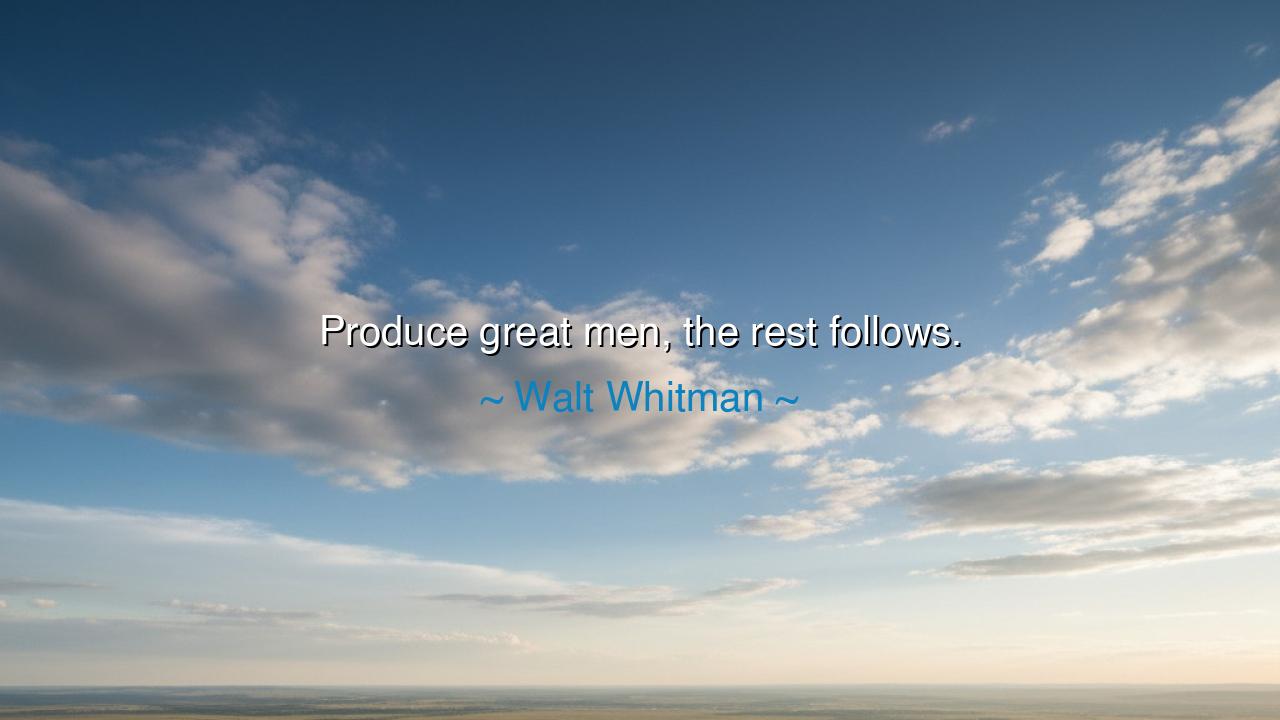
Produce great men, the rest follows.






“Produce great men, the rest follows.” Thus spoke Walt Whitman, the poet of democracy and the prophet of the human spirit. In this brief but thunderous declaration lies the essence of his faith — that the strength of a nation, a civilization, even of humanity itself, flows not from wealth, laws, or armies, but from the character of its people. For Whitman, greatness was not a thing of crowns or conquest, but of soul — of courage, vision, and moral power. He believed that if a society could shape great men, all else — progress, justice, beauty, and truth — would follow like rivers flowing from a high spring.
Whitman wrote these words in the nineteenth century, in the dawn of a new America. The land was raw, restless, and full of contradictions — vast freedom and deep division, hope and greed side by side. Yet he saw beyond the surface to the heart of destiny. The young republic, he believed, would not be made great by its institutions alone, but by the quality of the men and women it raised — by the teachers, dreamers, workers, and leaders whose souls would lift the common good above personal gain. His cry was a call to cultivation — not of the soil alone, but of human greatness.
When Whitman said “produce great men,” he did not mean to manufacture them by decree or design, as one might produce machines. He spoke of a moral and spiritual growth, born of liberty and self-reliance. A nation, he thought, should be like fertile earth, nurturing the roots of courage, creativity, and compassion. If it raises citizens who think nobly and act bravely, its future is secure. If it neglects this task — if it breeds only the small-minded, the fearful, and the selfish — then all its riches and systems will crumble. For greatness is the seed, and civilization is the tree that grows from it.
We see the truth of Whitman’s words in the story of George Washington, who stood at the dawn of his country’s birth. America was a fragile dream, uncertain and untested, and yet through the strength of a few great men, it found its form. Washington’s calm virtue steadied the revolution; his restraint preserved the republic. He was not perfect, but he was great — not by title, but by example. Through his courage and humility, he embodied the principle Whitman would later proclaim: build men of greatness, and the rest follows — freedom, unity, and endurance.
And history repeats this lesson in every age. The Renaissance was not born from wealth or conquest, but from great minds — da Vinci, Michelangelo, Galileo — who stretched the limits of imagination. The moral victories of the twentieth century came not from institutions, but from great souls like Gandhi, Mandela, and Martin Luther King Jr., who turned suffering into strength and injustice into awakening. Each was a product not of power, but of principle — the flowering of a people’s conscience. Where such souls arise, humanity itself rises with them.
To produce great men, however, we must first honor the soil that births them — education, character, and freedom of thought. We must teach not only knowledge, but wisdom; not only ambition, but empathy; not only success, but sacrifice. Greatness cannot be imposed — it must be inspired. Every home that teaches integrity, every teacher who awakens curiosity, every community that values virtue over vanity — these are the true foundries of greatness. The task is slow and sacred, yet from it, all things noble flow.
Thus, O seeker of wisdom, understand this eternal law: greatness is the foundation upon which all progress stands. Wealth fades, empires fall, systems decay — but the influence of great men and women endures like flame in the dark. If you wish to strengthen your nation, strengthen the spirit of its people. If you wish to change the world, begin by becoming great yourself — not in pride, but in service; not in dominance, but in truth.
For Whitman’s words are not a relic, but a living command: Produce great men, the rest follows. Nurture your mind, guard your integrity, lift your heart beyond selfish ends. The destiny of all humanity depends upon the few who dare to rise. Be one of them — for in every generation, it is the greatness of individuals that kindles the dawn of a better world.






AAdministratorAdministrator
Welcome, honored guests. Please leave a comment, we will respond soon